
Aircraft Electrician
What exactly do electrical engineers for aeronautical systems do?
Electrical engineers produce aircrafts and aeronautical systems, install and repair them. Furthermore, they install and maintain flight-safety technology, assemble electrical systems and devices in aircrafts, make sure they work smoothly and maintain or repair them. On top of that, they lay power-, signal- and data cables for aeronautical systems and assemble components and devices for aeronautical systems. Electrical engineers work in companies in the aviation and space industries, at airlines, flying schools or in the Army.
Which requirements do electrical engineers for aeronautical systems need to fulfil?
A high school diploma is the basic requirement to pursue training as an electrical engineer. Moreover, the following skills belong to the most important requirements for this profession:
- Technical talent
- Good manual abilities
- Proficient in English
- Good knowledge using software.
How can I become an electrical engineer for aeronautical systems?
Electrical engineering is a recognised skilled occupation according to the Vocational Training Act (BBiG).
Where does training to become an electrical engineer for aeronautical systems take place?
The 3 1/2-year training is regulated nationwide and takes place in industry companies.
How good are the prospects and advancement opportunities as an electrical engineer for aeronautical systems?
There are various opportunities for advancement possible in this business; they vary from employer to employer.
How high is the salary as an electrical engineer for aeronautical systems?
The salary as an electrical engineer for aeronautical systems varies from employer to employer. The average gross salary comes to around 2,700 EUR (status from 2010).